Saltivka, el distrito fantasma de Járkiv
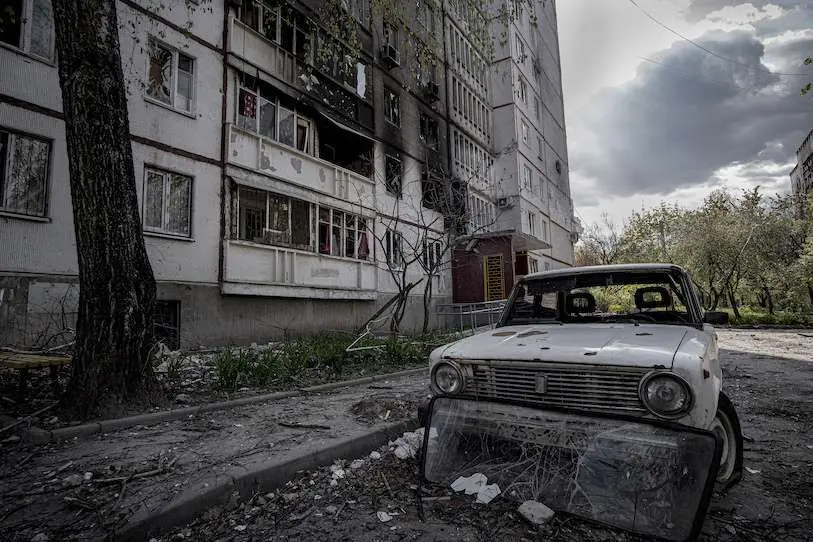
Maria Senovilla from Saltivka,(Ukraine)
The echo of the windows creaking as you walk on them and the buzzing of flies from inside doorways can only cease to be heard when a new bombardment shakes the streets. It is the sound of a ghost town. Broken glass, flies and explosions. The same soundtrack one street after another, all reduced to rubble by the Russian rockets that keep falling on Ukraine's largest dormitory city.
Of the nearly 800,000 people who once lived in Saltivka, less than 5 per cent remain. Most of them are elderly, and they refuse to be evacuated. They survive without electricity, running water, gas, supermarkets, pharmacies or any other services.
For cooking, they split wood from trees that once provided shade in the streets and gardens. Water is collected from a spring. And they rely on the few volunteers who dare to enter the district - wearing helmets and bulletproof vests - to bring food and medicine. Firefighters no longer even enter to douse the flames after the bombardments, which have been engulfing building after building since the war began.
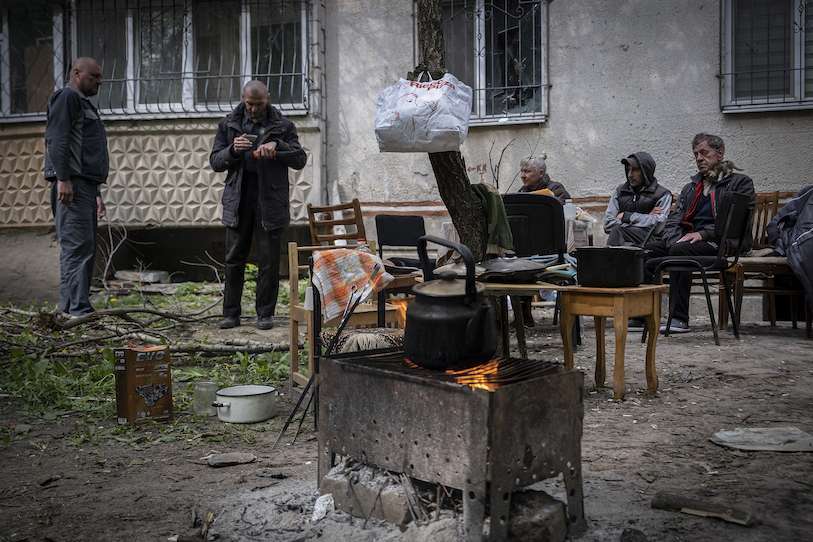
THE BIGGEST MARKET IN EUROPE
Not a single façade in Saltivka is intact. All of them are pockmarked and pockmarked, and most of them are burnt by the fires caused by the bombing. Through the broken glass of the ground floor, you can even see tables with dishes on them, and clotheslines with clothes still hanging on them. As if the clock had stopped when the families who lived there ran out.
One third of the population of Kharkiv lived in this district. It was conceived in the 1960s as a Soviet-style residential neighbourhood, with modest multi-storey housing and good connections to the city's industrial areas. But in recent decades, modern skyscrapers and 15+ storey buildings have been interspersed with shopping centres, gardens, schools and secondary schools.
This is also where Europe's largest market is located. Or rather, it was. Because during the third week of the war it was burnt to the ground by Vladimir Putin's army.
The Barabashov market was one of the most emblematic places in the city. It was named after the iconic astronomer Nikolai Barabashov, rector of the University of Kharkiv and director of the Observatory since the 1930s, who famously published the first images of the dark side of the moon in 1961.
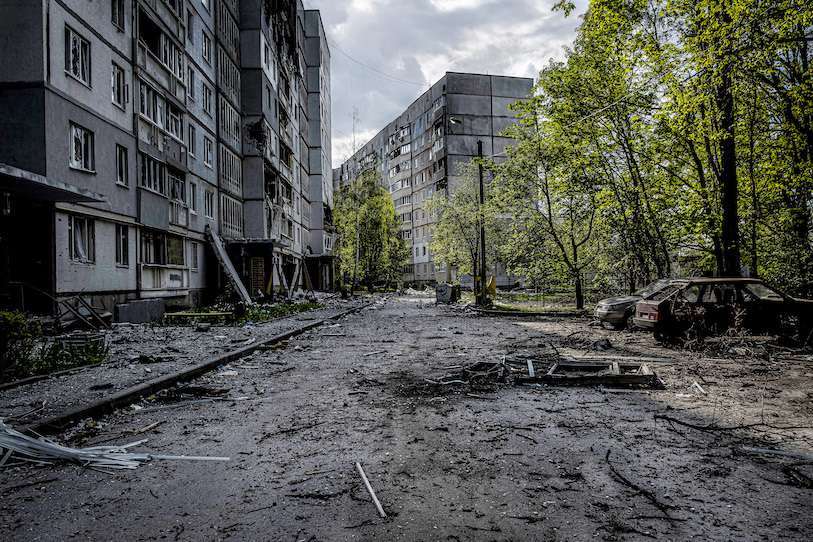
This market had a surface area of 300,000 square metres, where you could buy almost anything, until the rockets destroyed it all. It was a double attack. As firefighters were putting out the huge fire that broke out after the first bombardment, Russian troops fired again. Twenty-one people were killed and another 25 wounded. It was one of the bloodiest attacks ever recorded in the region.
After that day, all remaining supermarkets and pharmacies in Saltivka were closed. And the exodus of residents was almost total. Ukraine's largest dormitory town became a huge ghost town.
THE RESISTANCE
The few people who peek out from time to time between the buildings - mostly elderly people - ask everyone they see if they have humanitarian aid for them. It is heartbreaking. The food that the voluntary associations manage to bring in is not enough.
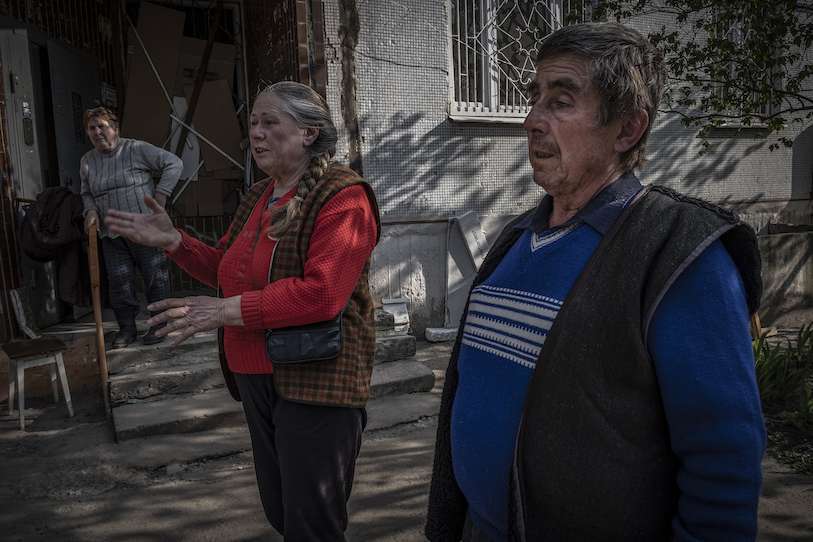
In addition, there are days when the army does not allow them access to certain neighbourhoods in the district because of the intensity of the shelling. And they can't deliver medicines or food. Even the paramedics don't get in regularly.
Tatiana and Leonid are among the 5 percent of residents who have refused to leave. They are 64 and 72 years old, and have lived in Saltivka since 1988. When asked "why haven't they left?", they tell Atalayar that they do not leave their home simply because "we have nowhere else to go; this is our only home".
They managed to send their children abroad when the invasion began, but they decided not to accompany them because "we are too old for that, we don't matter and no one needs us there". Leonid talks about it with a close smile on his lips, but his eyes glaze over as the words come out of his mouth.
Every night they sleep in the basement of their building, a building in which there are only four people left. It is a damp basement, with extremely low ceilings, which makes it necessary to move around the space in a crouched position. In one part, which they use as a kitchen, they have a cooker; on the other side, three bunk beds.
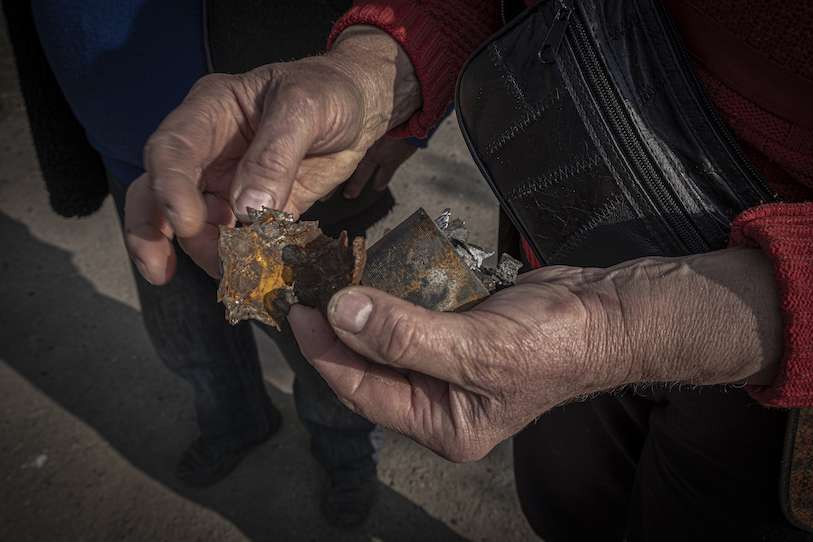
Before saying goodbye to Atalayar, the couple shows us a bucket full of fragments of Russian shells they have collected from their neighbourhood. They keep it next to the jerry cans of water they stack at the entrance to the basement/shelter, which they use for cooking and washing.
RELENTLESS FIGHTING
In the northern part of Saltivka, the situation is even worse. The constant barrage of rockets makes life there impractical. In an hour you can hear four or five detonations. Even Ukrainian troops are not fighting in this part of Kharkiv; they have set up their trenches several kilometres behind, leaving the north of the district under crossfire.
Several access routes have been cut off by mines, and it is necessary to make a detour to find a passable access road. In the early days of the war, there was also ground fighting here. A Russian special forces unit managed to break through Saltivka and reach the centre of Kharkiv.
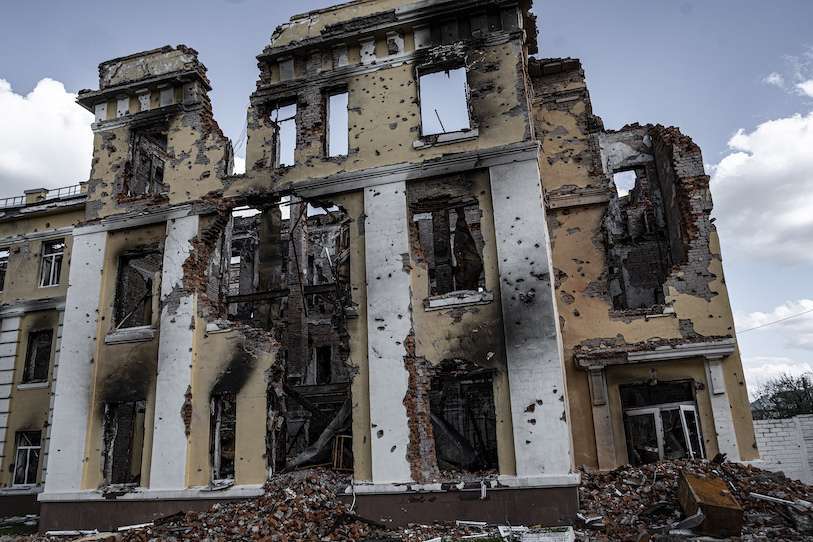
There they barricaded themselves in School 134, where they were shot down by the Ukrainian Armed Forces. In the three hours of fighting, the school was practically pulverised. Only the skeleton of the facade and a pile of ashes remained. And all twenty Russian special forces soldiers were killed.
But the scars left by this war on Kharkiv are still vivid. After the failed attempt to take the city on 24 February, the siege has continued unabated. New bombardments are recorded every day, several times a day. And not only in Saltivka, but also in the centre of the capital.
There, in the central area, residents can still be seen trying to make a living. But the streets are strangely empty and the traffic is unbecoming of a big city. Most of those who have stayed behind can't work, because everything is closed except for supermarkets and pharmacies. And the shadow of Saltivka is very much present, as is the trickle of deaths that continue to occur as a result of Russian bombardment.








